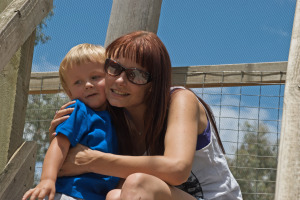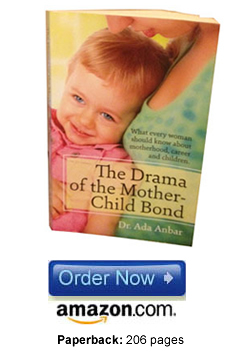 What is a mother’s actual job description? Why should a young, healthy, and energetic woman, often highly educated and professionally experienced, stay home for a few years with a new baby?
What is a mother’s actual job description? Why should a young, healthy, and energetic woman, often highly educated and professionally experienced, stay home for a few years with a new baby?
Are the first two to three years of a child’s life worth a mother putting her own career and personal interests on hold?
In a word – yes!
The manner in which you raise your child during these few early years will greatly determine if he/she will be bright or dull, much more than so than their genetic make-up.
This is true irrespective of your social or economic conditions. It’s that simple.
Childcare responsibilities can be divided into three areas of development. Physical
Social/emotional
Mental/cognitive
Here are a few examples of the absolutely critical role of the mother in all three of these developmental areas.
Physical: More than Just Feeding, Diapering and Bathing
Parents often assume that the essentials of childcare are feeding, changing, bathing, hugging and cooing and an occasional visit to the doctor’s office.
And it would seem that almost anyone qualified could provide those essentials for a baby – a nurse, a daycare worker, a friend or relative.
Yet, we now know that there is much more to proper childcare and good mothering during the early years than was previously thought, and much more to healthy child development.
The best example of the need for emotional connection during those times of feeding, changing, bathing and so on, are the orphanages in some countries where children’s physical needs were met, but without the accompanying emotional care. Many of these children, even at 4 and 5 years of age, were only able to communicate with simple gestures. They were emotionally damaged. Their need for love was palpable and heart-breaking.
Social/Emotional
Emotions dominate our early life more than they will ever again. It is through crying, smiling and fussing that babies elicit a response from their caregivers and through the response to their emotional communications, they either develop feelings of security and confidence, or do not.
Of all the foundational feelings that a young child must experience love is the most important. Ann Daly, a British psychiatrist says: “Of all that the child absorbs from the good mother … the most important are probably loving feelings that are not contingent.”
No one can love a child unconditionally like a mother.
Mental/Cognitive
In the early years of life, a child’s brain develops faster than at any other period of life. The child’s environment, and the adults who are in charge of that environment, have immeasurable opportunity to affect the developing brain’s potential and to shape its future mental capability.
The Centrality of Mom
The importance of the first few years of life and the centrality of the mother in shaping the child’s development during this period is critical. Many parents intuitively understand this.
Yet too many other parents do not realize just how critically important they are during these first few years of life. Lacking this understanding they often make poor child care decisions.





